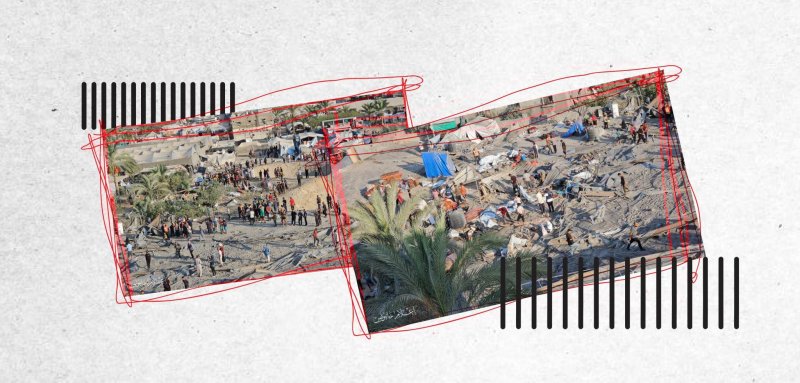As the first rays of morning light appeared, 38-year-old displaced Maysoun Ta'ma sat by a deep sand pit in the al-Mawasi refugee camp, Khan Yunis. She couldn’t stop crying, after spending an entire night digging through the sand with her bare hands, asking anyone she came across if they had pulled out the bodies of her family. But it was all in vain.
The sand had swallowed the bodies of Maysoun’s sister and her family whole, after the refugee camp was buried in a massacre carried out by Israel just past midnight on Monday, August 10, 2024. The Israeli military targeted the camp west of Khan Younis, an area it had declared months ago as a "humanitarian safe zone,” sheltering around 80,000 displaced people.
According to eyewitness testimonies, the bodies of the displaced were torn apart; some were found in pieces, while others were completely vaporized, leaving no trace behind. The Gaza government media office confirmed in a statement that 22 martyrs never reached the hospitals because their bodies had melted away.
According to the Euro-Med Human Rights Monitor, the Israeli bombing of the camp was carried out with American-made MK-84 bombs. The shelling left three large craters as deep as 10 meters, burying an entire camp housing around 40 tents under the sand, according to the Palestinian Civil Defense.
According to eyewitness testimonies, the bodies of the displaced were torn apart; some were found in pieces, while others were completely vaporized, leaving no trace behind. The Gaza Government Media Office confirmed in a statement that 22 martyrs never reached the hospitals because their bodies had melted away. Meanwhile, the Civil Defense announced that they had recovered 40 bodies and 60 others injured from the bombing site.
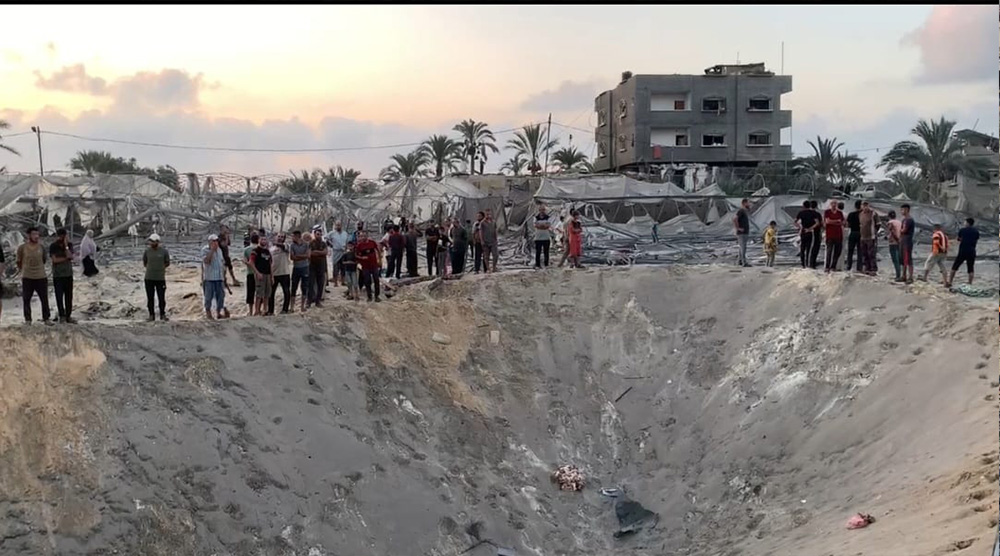 The deep crater left by the Israeli bombing at al-Mawasi refugee camp
The deep crater left by the Israeli bombing at al-Mawasi refugee camp
The deep crater left by the Israeli bombing at the al-Mawasi refugee camp.
An entire camp disappeared in an instant
“Half an hour before the massacre, I was sitting with my sister, Wiam, in her tent. We had a lovely time. She told me how exhausted she was from being displaced and how she dreamed of returning to her home, which she had fled eight months ago in the Al-Shati camp, west of Gaza,” Maysoun tells Raseef22.
"We ran from death only to find more death. The army claims there are safe zones, but they are exterminating us. I survived the last al-Mawasi massacre, but this time, I lost my five-year-old son."
The sisters felt sleepy, so Maysoun returned to her tent to rest. But at midnight, "It felt like an earthquake hit the area. Airstrike after airstrike. Sand fell down on the camp and covered the tents as if it were rain. The smell of gunpowder was everywhere,” she added.
Maysoun found out her sister’s tent was among those targeted, so she rushed to the scene. “I was running in the dark, stumbling over the bodies of displaced people and their scattered limbs. I tripped over a person whose body had been torn in half. He was still alive and screaming for help, but no one saw him,” she explained.
Trembling with fear for her sister Wiam, Maysoun finally reached the site. Her legs could no longer carry her, and she fell to the ground when she found three deep craters and no sign of her sister’s tent.
“I was running in the dark, stumbling over the bodies of displaced people and their scattered limbs. I tripped over a person whose body had been torn in half. He was still alive and screaming for help, but no one saw him.”
She and her husband began digging with primitive tools, to no avail—there was no trace of the tent or her sister’s body. She became certain that the family had been completely buried under the sand, or perhaps their bodies had been vaporized or torn to pieces.
“I don’t want anything. I just want to bury my sister’s body in a grave alongside her family. The pain is eating away at my heart for her. She was so kind, and all she wanted was to live safely with her three children and her husband,” Maysoun said.
Spokesperson for Civil Defense in Gaza Mohamed Bassal stated that the heavy concussion missiles used over worn-out tents made of old fabric and plastic "completely annihilated the camp and turned the ground under them into deep craters."
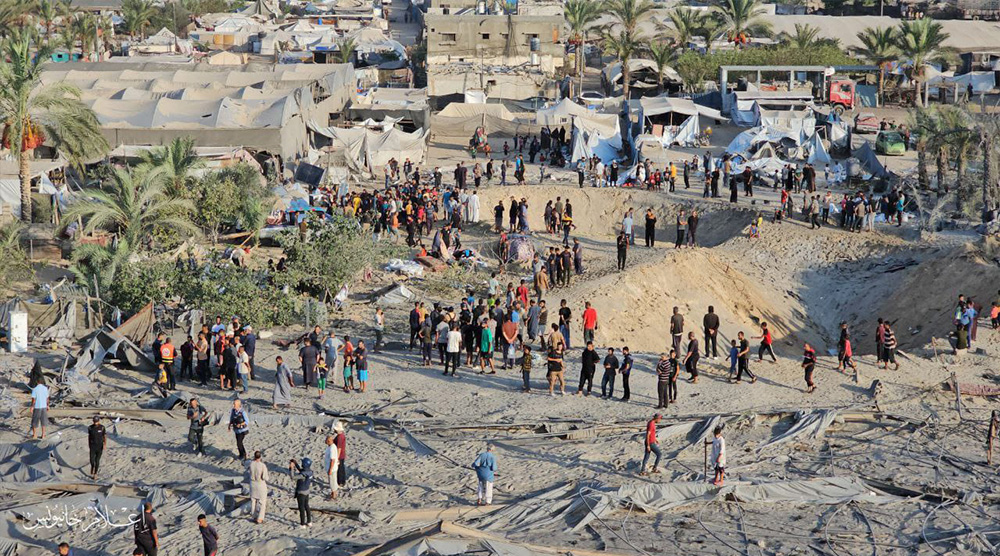 The site of the new massacre in al-Mawasi, Khan Yunis.
The site of the new massacre in al-Mawasi, Khan Yunis.
The site of the new massacre in al-Mawasi, Khan Yunis.
“Half an hour before the massacre, I was sitting with my sister, Wiam, in her tent. She told me how exhausted she was from being displaced and how she dreamed of returning to her home. I don’t want anything. I just want to bury my sister’s body in a grave alongside her family. The pain is eating away at my heart for her. She was so kind, and all she wanted was to live safely with her three children and her husband.”
Video footage showed rescue operations searching for the missing beneath the sand in the early hours of the morning after “entire families disappeared under the sand in deep holes, in this latest massacre,” according to Bassal.
Their bodies were either vaporized or incinerated
Ismail al-Thawabteh, Director General of the Government Media Office in Gaza, confirmed to Raseef22 that "the massacre left dozens of martyrs. Only 19 of them were recorded in the Ministry of Health's records. The rest of the martyrs never made it to us because the bodies were vaporized. In addition, there are 60 injured and dozens others missing."
Al-Thawabteh pointed out that 22 displaced people were reported missing by their families. Despite an entire day of continuous search efforts by Civil Defense and ambulance crews, their bodies had yet to be found.
At another corner of the “massacre pit,” 40-year-old displaced Gazan Ali Ismail wept uncontrollably, his face covered in gunpowder and ash.
“They burned my children while they slept. The fire engulfed the tents they were sleeping in. They told us to go to al-Mawasi Khan Yunis just so they could kill us, burn us, and bury us alive.”
“They burned my children while they slept. The fire engulfed the tents they were sleeping in. They told us to go to al-Mawasi Khan Yunis just so they could kill us, burn us, and bury us alive,” Ismail said, referring to the Israeli army's orders that forced the displaced people to move from Rafah to the Israeli-designated humanitarian safe zone of al-Mawasi.
Ismail lost his five-year-old son, Rami, whose charred body he only identified by a severed finger from a previous injury at the beginning of the war. His other son, Mohamed, suffered burns all over his body.
“I didn’t hear the sound of the missiles. I was deep asleep in the tent with my children. Suddenly, I woke up to the screams of displaced people around me and saw the fire spreading through the tents. I couldn’t find my children, so I started running all over in search of them,” Ali tells Raseef22.
He added, “The medics rushed to the crater to search for the tents buried under the sand. Other displaced people helped me put out the fire using kitchen pots and pans by filling them with water.”
Ismail lost his five-year-old son, Rami, whose charred body he only identified by a severed finger from a previous injury at the beginning of the war. His other son, Mohamed, suffered burns all over his body.
"I found my son Mohamed screaming, his body badly burnt. Then, around 4 a.m., I finally found Rami’s body after great difficulty,” said the grieving father.
Ismail was forcibly displaced to al-Mawasi camp following orders from the Israeli army. "We ran from death only to find more death. The army claims there are safe zones, but they are exterminating us. I survived the last al-Mawasi massacre, but this time, I lost my five-year-old son."
He continued, questioning: "What wrong have our children done? What wrong have we done? My children were sleeping peacefully. I have been displaced with them ten times in seven months, from Jabalia camp to the south, moving from place to place, just trying to protect them."
Abdel Salam Madi, a displaced man from Rafah who lives in a tent near the massacre site, miraculously survived. "What happened felt like Judgment Day had come," he tells Raseef22.
He added, “The displaced people were running everywhere in the camp. The ground was shaking beneath us. At the moment of impact, we were thrown out of the tent by the force of the explosion. Shrapnel from the missiles hit my mother’s hand, and it was instantly severed while she was sleeping."
"I found my son Mohamed screaming, his body badly burnt. Then, around 4 a.m., I finally found Rami’s body after great difficulty. What wrong have our children done? What wrong have we done? My children were sleeping peacefully. I have been displaced with them ten times in seven months, moving from place to place, just trying to protect them."
“We’ve escaped death many times, and each time, dozens of martyrs fell in front of us in the displacement camps. Where can we go? There is absolutely no safety, and the Israeli army lies about safe zones in the south," Abdel Salam emphasized.
Rescue crews informed Raseef22 that they had been working since the first hours of the massacre, using very modest equipment to search for and retrieve the bodies of the martyrs. Meanwhile, they also needed to tend to other injured individuals in different areas in southern Gaza that Israel is targeting.
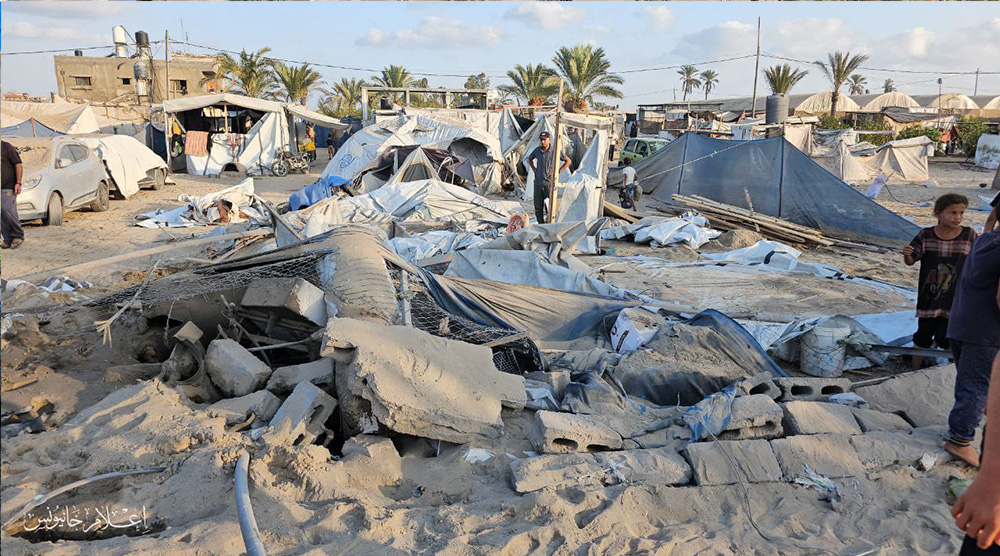 The site of the new massacre in al-Mawasi, Khan Yunis.
The site of the new massacre in al-Mawasi, Khan Yunis.
The site of the new massacre in al-Mawasi, Khan Yunis.
Another massacre justified by Israel
Immediately following the massacre, the Israeli army justified its attack on the tents, claiming: "We took steps to minimize harm to civilians." It also said in a statement that "the strike came after gathering intelligence from the Southern Command and the Shin Bet, targeting a hidden Hamas complex."
"What happened felt like Judgment Day had come. The ground was shaking beneath us. At the moment of impact, we were thrown out of the tent by the force of the explosion. The displaced people were running everywhere in the camp. Shrapnel from the missiles hit my mother’s hand, and it was instantly severed while she was sleeping.”
The army’s statement alleged they had targeted "key Hamas leaders, including Samer Ismail Khader Abu Daqqa, the commander of the aerial forces in the Al-Qassam Brigades, Osama Tabash, head of surveillance in the group’s military intelligence division, and Ayman Mabhouh, a senior commander." The statement denied that there were any Palestinian civilian casualties.
In response, Hamas denied its fighters were present at the scene of the strike, saying in a statement: “The occupation’s allegations of the presence of resistance fighters are a blatant lie aimed at justifying these heinous crimes.”
The statement added: "The resistance has repeatedly denied the presence of any of its members among civilian gatherings or the use of these locations for military purposes."
"We’ve escaped death many times. Where can we go? There is absolutely no safety, and the Israeli army lies about safe zones in the south."
This is the second massacre committed by the Israeli army in al-Mawasi Khan Yunis, which had been declared a "humanitarian safe zone" months ago. The first massacre, on the morning of July 13, killed around 90 Palestinians and injured approximately 300 others.
At the time, Israeli media outlets reported the assassination of Mohammed Deif, the general commander of Al-Qassam Brigades, but Hamas quickly asserted that Deif was alive and continuing his work.
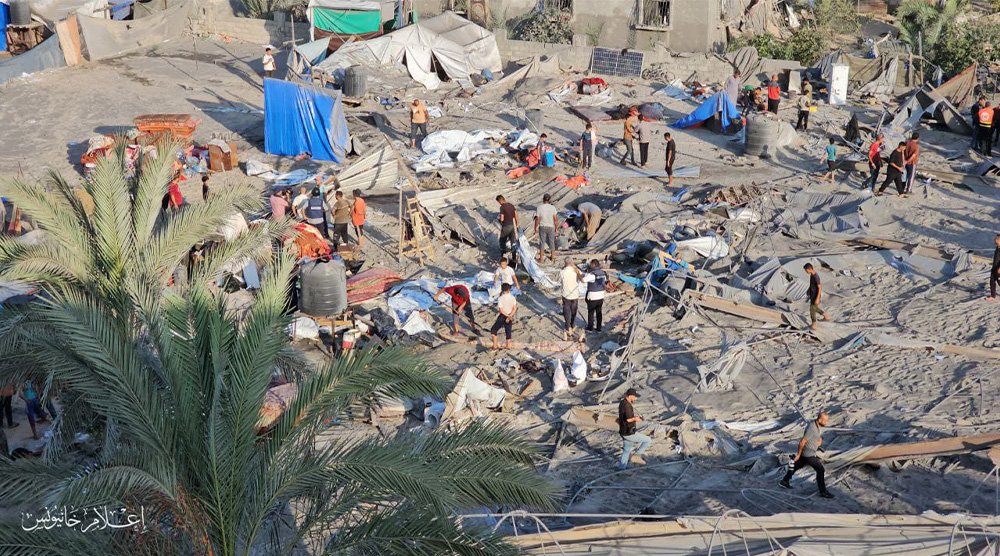 The site of the new massacre in al-Mawasi, Khan Yunis.
The site of the new massacre in al-Mawasi, Khan Yunis.
The site of the new massacre in al-Mawasi, Khan Yunis.
Raseef22 is a not for profit entity. Our focus is on quality journalism. Every contribution to the NasRaseef membership goes directly towards journalism production. We stand independent, not accepting corporate sponsorships, sponsored content or political funding.
Support our mission to keep Raseef22 available to all readers by clicking here!
Interested in writing with us? Check our pitch process here!
